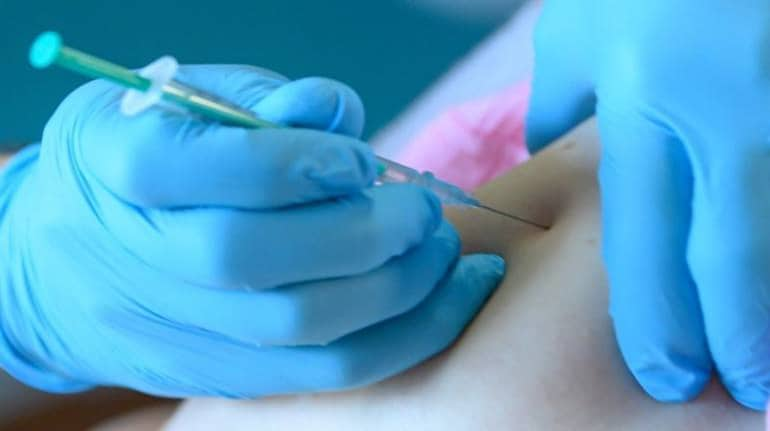



A study on women undergoing breast cancer surgery has shown that patients injected with 0.5 percent lidocaine, a commonly used local anaesthesia agent, around the tumour prior to surgery shows significant and substantial increase in cure rates and survival.
“This is the first study of its kind globally that has shown a sizeable benefit by single intervention prior to surgery. If implemented across the world, it has the capability to save over 100,000 lives annually. For scientists, it opens the window of peri-operative (around the time of surgery) intervention to modulate the environment of cancer in such a way as to prevent its deleterious reaction to the act of surgery,” Rajendra Badwe, director, Tata Memorial Centre, who is the lead investigator of this study, said.
The study, ‘Effect of Peri-tumoral Infiltration of Local Anaesthetic Prior to Surgery on Survival in Early Breast Cancer’, is a randomised controlled trial on 1,600 women with early breast cancer who were scheduled to be treated with surgery.
The study was conducted by investigators at 11 cancer centres in India including Tata Memorial Centre in Mumbai over an 11-year period between 2011 and 2022.
“Evolving low-cost interventions for cancer has been a mission of Tata Memorial Centre and the Department of Atomic Energy for the benefit of Indian and global populations and this study is a major step towards Atmanirbhar Bharat,” he added.
Dr Badwe also presented the result of this study at the ongoing European Society of Medical Oncology (ESMO) Congress in Paris, one of the most prestigious cancer conferences in the world held annually in Europe.
The results of this trial show that this simple, low-cost intervention significantly and substantially increases the cure rates and survival with a benefit that is ongoing for several years after surgery.
The researchers say that the injection requires no additional expertise, is inexpensive and can result in saving up to 100,000 lives annually globally.
Improved cure rate by anaesthesia usageIn the multicentre study by Tata Memorial Centre of 1,600 women with early-stage breast cancer, half of the patients constituting the control group underwent standard surgery followed by standard postoperative treatment including chemotherapy, hormone therapy and radiotherapy as per guidelines.
The other half, constituting the intervention group, received an injection of a commonly used local anaesthesia agent, 0.5 percent lidocaine, all around the tumour, just prior to surgery.
Also read: Micro labs get clean chit from IPA on allegations of spending Rs 1000 crore on Dolo 650
After completion of treatment, patients underwent regular check-ups for several years to compare the rates of cure and survival between the control group and local anaesthesia group.
“The six-year disease-free survival (cure rate) was 81.7 percent in the control group and 86.1 percent in the local anaesthesia group for 26 percent relative reduction in the risk of cancer relapse or death with the local anaesthesia injection, which was statistically significant,” Tata Memorial Hospital said.
“Similarly, the six-year overall survival was 86.2 percent versus 89.9 percent in the two groups for a 29 percent reduction in the risk of death with the local anaesthetic injection, which was also statistically significant,” it added.
Low-cost intervention in breast cancerSudeep Gupta, professor of medical oncology at Tata Memorial Centre and one of the co-investigators of the study, said, “This study provides an inexpensive and immediately implementable treatment in breast cancer which can be practiced by every surgeon who treats this disease.”
Dr Gupta said the results from a large randomised trial, which is the gold standard way of evaluating the worth of new treatments, provides the highest level of evidence to support the use of this technique.
“This study is proof that Indian centres can design and conduct studies which have a global impact,” he added.
Sajjan Rajpurohit, director, medical oncology, Max Super Speciality Hospital, Shalimar Bagh, Delhi, said that the best thing about this study is that it’s a very simple process that can be performed by all the breast cancer surgeons.
“The surgeons can infiltrate the peritumoral (the area around the tumour) with local anaesthetics. This can help in prevention of spillage of tumour cells in the nearby environment and it also has a positive impact on the tumour microenvironment which leads to higher curability in breast cancer patients,” he said.
Dr Vineeta Goel, Director and Head of Department, Radiation Oncology, Fortis Shalimar Bagh, said the finding of this study was like a 'master stroke', which involved least cost with no side effects and had huge advantages for cancer patients.
"This is a very exciting and novel study on breast cancer from Tata memorial hospital. It uses a very simple technique of local anaesthetic injection around tumour at the time of surgery. This injection in turn prevents possible cancer cell spread during surgery and improves survival of patient," she added.
Discover the latest Business News, Sensex, and Nifty updates. Obtain Personal Finance insights, tax queries, and expert opinions on Moneycontrol or download the Moneycontrol App to stay updated!
Find the best of Al News in one place, specially curated for you every weekend.
Stay on top of the latest tech trends and biggest startup news.